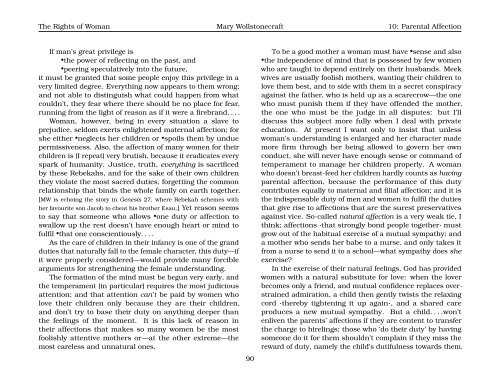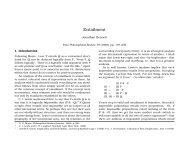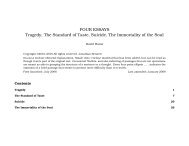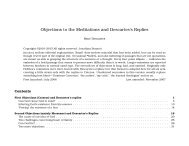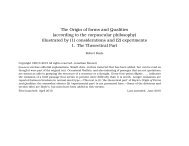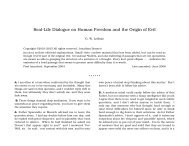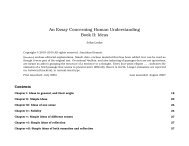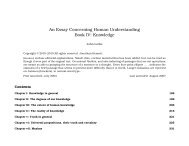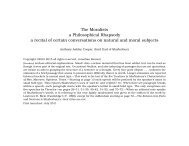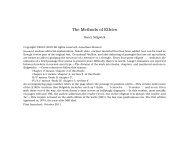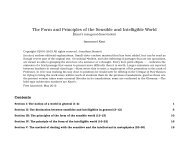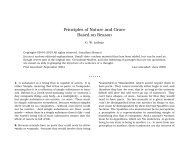A Vindication of the Rights of Woman with - Early Modern Texts
A Vindication of the Rights of Woman with - Early Modern Texts
A Vindication of the Rights of Woman with - Early Modern Texts
You also want an ePaper? Increase the reach of your titles
YUMPU automatically turns print PDFs into web optimized ePapers that Google loves.
The <strong>Rights</strong> <strong>of</strong> <strong>Woman</strong> Mary Wollstonecraft 10: Parental Affection<br />
If man’s great privilege is<br />
•<strong>the</strong> power <strong>of</strong> reflecting on <strong>the</strong> past, and<br />
•peering speculatively into <strong>the</strong> future,<br />
it must be granted that some people enjoy this privilege in a<br />
very limited degree. Everything now appears to <strong>the</strong>m wrong;<br />
and not able to distinguish what could happen from what<br />
couldn’t, <strong>the</strong>y fear where <strong>the</strong>re should be no place for fear,<br />
running from <strong>the</strong> light <strong>of</strong> reason as if it were a firebrand. . . .<br />
<strong>Woman</strong>, however, being in every situation a slave to<br />
prejudice, seldom exerts enlightened maternal affection; for<br />
she ei<strong>the</strong>r •neglects her children or •spoils <strong>the</strong>m by undue<br />
permissiveness. Also, <strong>the</strong> affection <strong>of</strong> many women for <strong>the</strong>ir<br />
children is (I repeat) very brutish, because it eradicates every<br />
spark <strong>of</strong> humanity. Justice, truth, everything is sacrificed<br />
by <strong>the</strong>se Rebekahs, and for <strong>the</strong> sake <strong>of</strong> <strong>the</strong>ir own children<br />
<strong>the</strong>y violate <strong>the</strong> most sacred duties, forgetting <strong>the</strong> common<br />
relationship that binds <strong>the</strong> whole family on earth toge<strong>the</strong>r.<br />
[MW is echoing <strong>the</strong> story in Genesis 27, where Rebekah schemes <strong>with</strong><br />
her favourite son Jacob to cheat his bro<strong>the</strong>r Esau.] Yet reason seems<br />
to say that someone who allows •one duty or affection to<br />
swallow up <strong>the</strong> rest doesn’t have enough heart or mind to<br />
fulfil •that one conscientiously. . . .<br />
As <strong>the</strong> care <strong>of</strong> children in <strong>the</strong>ir infancy is one <strong>of</strong> <strong>the</strong> grand<br />
duties that naturally fall to <strong>the</strong> female character, this duty—if<br />
it were properly considered—would provide many forcible<br />
arguments for streng<strong>the</strong>ning <strong>the</strong> female understanding.<br />
The formation <strong>of</strong> <strong>the</strong> mind must be begun very early, and<br />
<strong>the</strong> temperament (in particular) requires <strong>the</strong> most judicious<br />
attention; and that attention can’t be paid by women who<br />
love <strong>the</strong>ir children only because <strong>the</strong>y are <strong>the</strong>ir children,<br />
and don’t try to base <strong>the</strong>ir duty on anything deeper than<br />
<strong>the</strong> feelings <strong>of</strong> <strong>the</strong> moment. It is this lack <strong>of</strong> reason in<br />
<strong>the</strong>ir affections that makes so many women be <strong>the</strong> most<br />
foolishly attentive mo<strong>the</strong>rs or—at <strong>the</strong> o<strong>the</strong>r extreme—<strong>the</strong><br />
most careless and unnatural ones.<br />
90<br />
To be a good mo<strong>the</strong>r a woman must have •sense and also<br />
•<strong>the</strong> independence <strong>of</strong> mind that is possessed by few women<br />
who are taught to depend entirely on <strong>the</strong>ir husbands. Meek<br />
wives are usually foolish mo<strong>the</strong>rs, wanting <strong>the</strong>ir children to<br />
love <strong>the</strong>m best, and to side <strong>with</strong> <strong>the</strong>m in a secret conspiracy<br />
against <strong>the</strong> fa<strong>the</strong>r, who is held up as a scarecrow—<strong>the</strong> one<br />
who must punish <strong>the</strong>m if <strong>the</strong>y have <strong>of</strong>fended <strong>the</strong> mo<strong>the</strong>r,<br />
<strong>the</strong> one who must be <strong>the</strong> judge in all disputes: but I’ll<br />
discuss this subject more fully when I deal <strong>with</strong> private<br />
education. At present I want only to insist that unless<br />
woman’s understanding is enlarged and her character made<br />
more firm through her being allowed to govern her own<br />
conduct, she will never have enough sense or command <strong>of</strong><br />
temperament to manage her children properly. A woman<br />
who doesn’t breast-feed her children hardly counts as having<br />
parental affection, because <strong>the</strong> performance <strong>of</strong> this duty<br />
contributes equally to maternal and filial affection; and it is<br />
<strong>the</strong> indispensable duty <strong>of</strong> men and women to fulfil <strong>the</strong> duties<br />
that give rise to affections that are <strong>the</strong> surest preservatives<br />
against vice. So-called natural affection is a very weak tie, I<br />
think; affections ·that strongly bond people toge<strong>the</strong>r· must<br />
grow out <strong>of</strong> <strong>the</strong> habitual exercise <strong>of</strong> a mutual sympathy; and<br />
a mo<strong>the</strong>r who sends her babe to a nurse, and only takes it<br />
from a nurse to send it to a school—what sympathy does she<br />
exercise?<br />
In <strong>the</strong> exercise <strong>of</strong> <strong>the</strong>ir natural feelings, God has provided<br />
women <strong>with</strong> a natural substitute for love: when <strong>the</strong> lover<br />
becomes only a friend, and mutual confidence replaces overstrained<br />
admiration, a child <strong>the</strong>n gently twists <strong>the</strong> relaxing<br />
cord ·<strong>the</strong>reby tightening it up again·, and a shared care<br />
produces a new mutual sympathy. But a child. . . .won’t<br />
enliven <strong>the</strong> parents’ affections if <strong>the</strong>y are content to transfer<br />
<strong>the</strong> charge to hirelings; those who ‘do <strong>the</strong>ir duty’ by having<br />
someone do it for <strong>the</strong>m shouldn’t complain if <strong>the</strong>y miss <strong>the</strong><br />
reward <strong>of</strong> duty, namely <strong>the</strong> child’s dutifulness towards <strong>the</strong>m.


